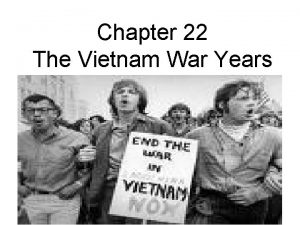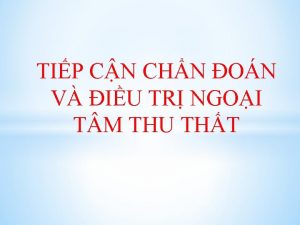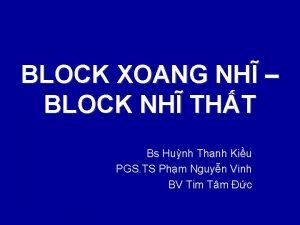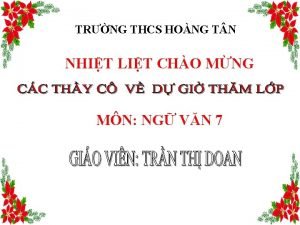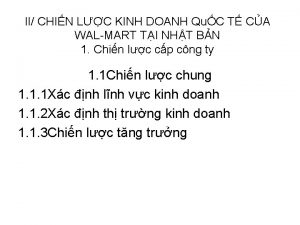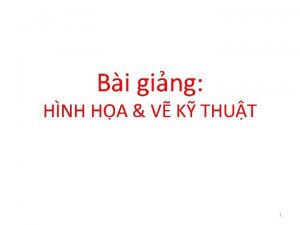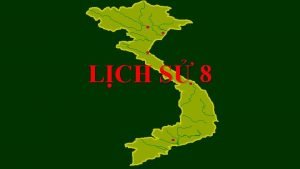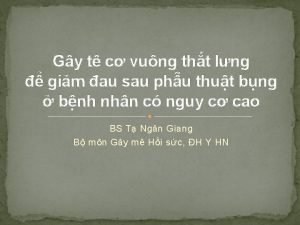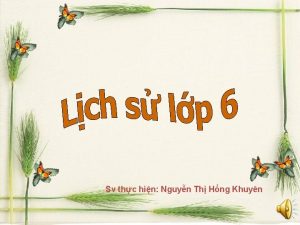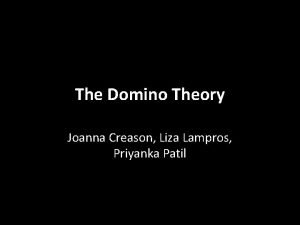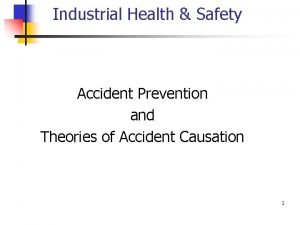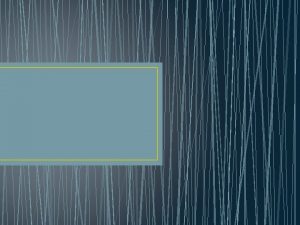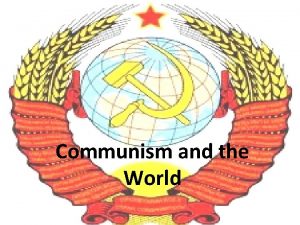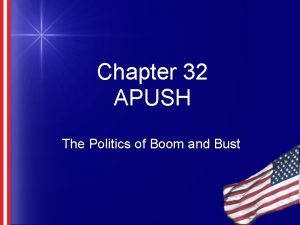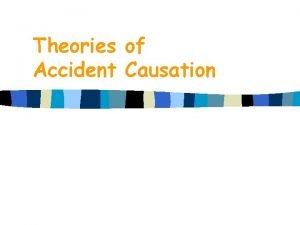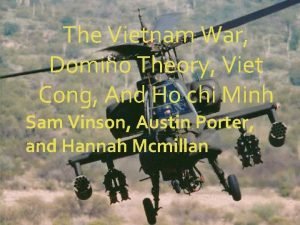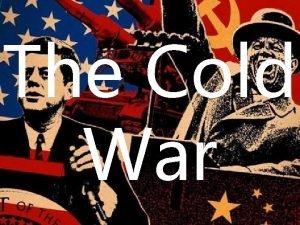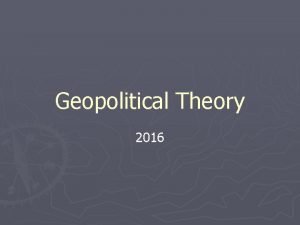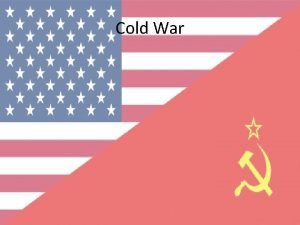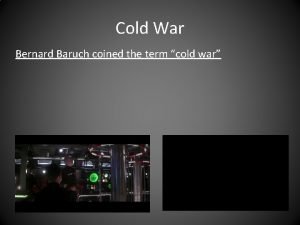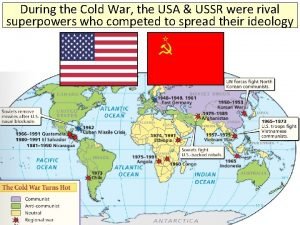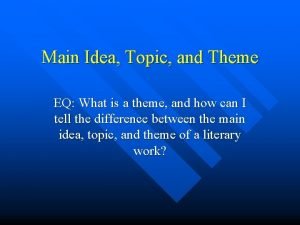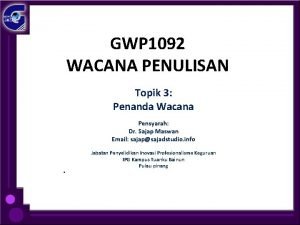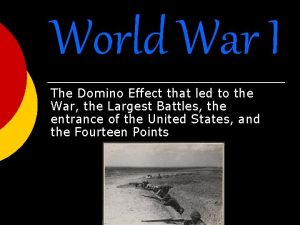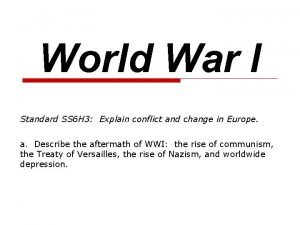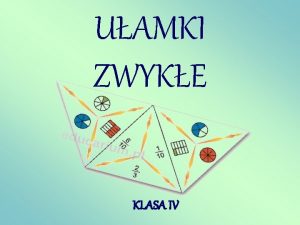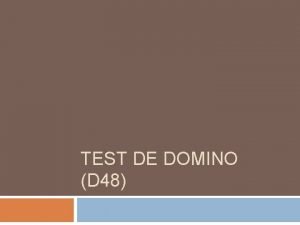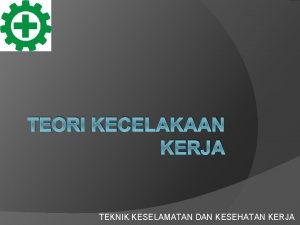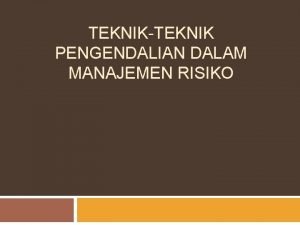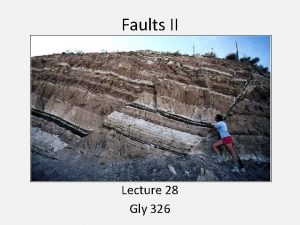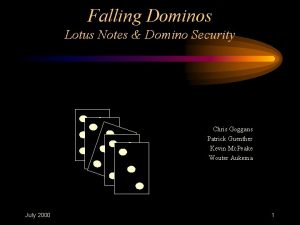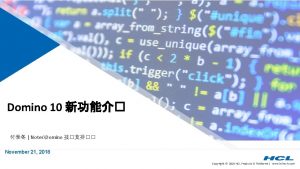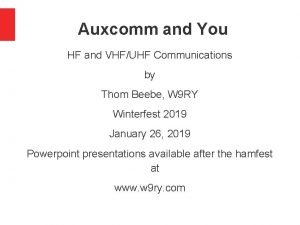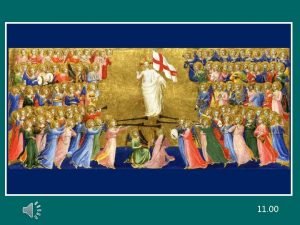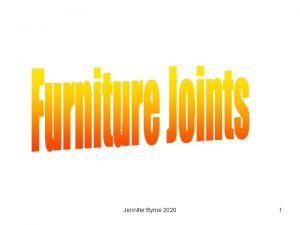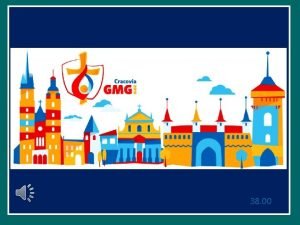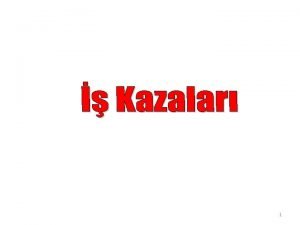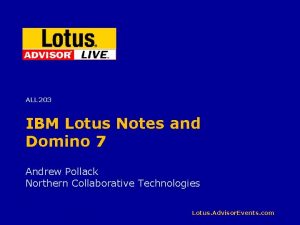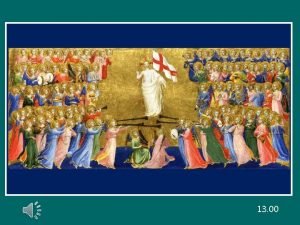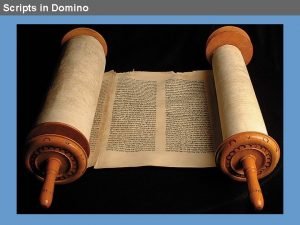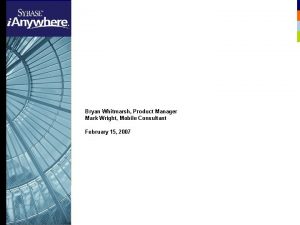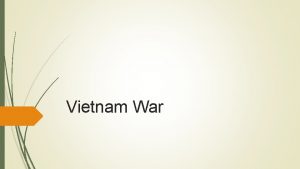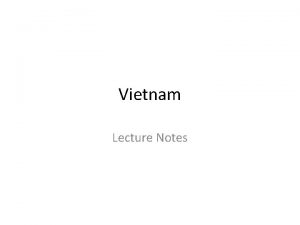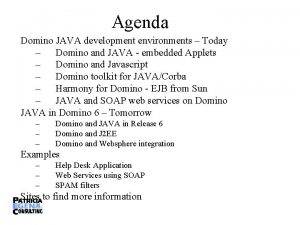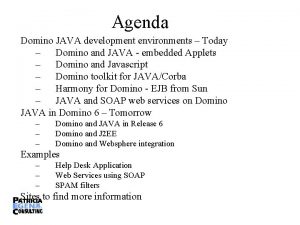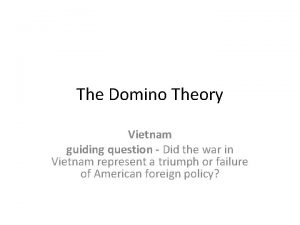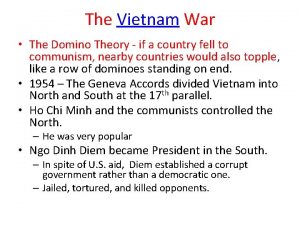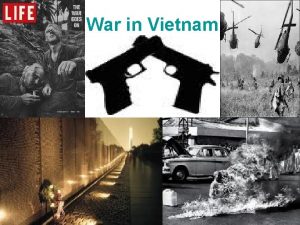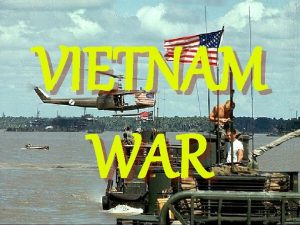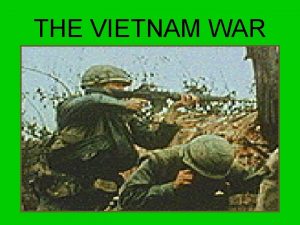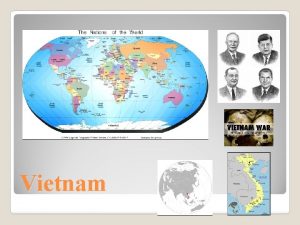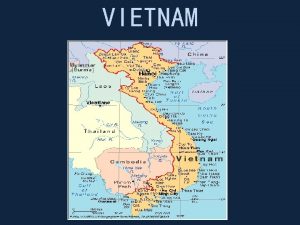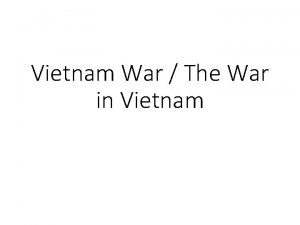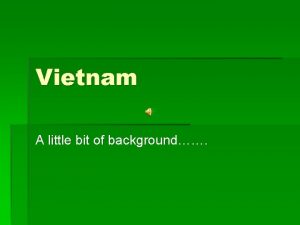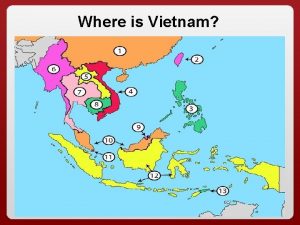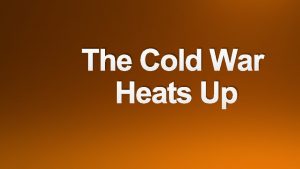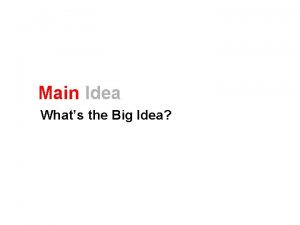Domino Theory idea that if Vietnam fell to
























































- Slides: 56


• Domino Theory- idea that if Vietnam fell to communism then surrounding countries would fall to communism • Term first used by Truman to rationalize sending aid to Greece and Turkey to help stop them from falling to Communism (1947)

Battle of Dien Bien Phu • March- May 1954 • Vietminh troops attacked French for 56 days • French surrendered • What happened? • French were in Dien Bien Phu wanting to cut off supply lines to Vietminh • Thought that because of the rough terrain they were safe from attack • Did not stop Vietminh

Dwight D. Eisenhower • Took office in 1953 - 1961 - Republican Referring to communism in Indochina, U. S. President Dwight D. Eisenhower put theory into words during an April 7, 1954 news conference: Finally, you have broader considerations that might follow what you would call the "falling domino" principle. You have a row of dominoes set up, you knock over the first one, and what will happen to the last one is the certainty that it will go over very quickly. So you could have a beginning of a disintegration that would have the most profound influences.

Geneva Accords of July 1954 1. Cease fire 2. Temporary division of Vietnam at 17 th parallel *Pro-Communism North and anti-Communism South* 3. No military alliances or foreign troops/bases allowed in North or South 4. National elections to be held in 1956 Reaction of U. S • Refused to sign agreement • Thought that it was a step forward for communism

Nation building in South Vietnam • SEATO (southeast Asia Treaty Organization)1954 -contain spread of communism in Southeast Asia (7 countries joined) • President Ngo Dinh Diem elected in 1955 Rigged election- won 98. 2% of the votes • Ngo Dinh Diem was anti-communist and catholic • U. S. supported Diem

U. S Aid • During Truman administration (1946 -1949)secret aid of $160 million • During Eisenhower - $ 3 million a year • Try to build up South Vietnamese Army- ARVN (Army of the Republic of Vietnam)

JFK- President 1961 -1963 • • Secretary of Defense Robert S. Mc. Namara Diem was weak & ARVN was weak Suggestions of disguising troops and settlement Short-term plans- increase military advisorsincrease in $$ • Operation Sunrise-March 1962 - Strategic Hamlet program- • Battle of Ap Bac- ARVN loses- shows weakness

• http: //www. youtube. com/watch? v=UM 3 ua. Xp 8 DAk

Down with Diem • Vietnamese resistance • Organized crime –private armies against- (anti-Diem) • Vietcong • Buddhist sects (anti-Diem) Problems with Diem 1. Favoritism towards family in government (nepotism) • Made brother- Ngo Dinh Nhu- head of secret policehad personal command over ARVN (but not formal executive position) 2. Resettled people (before Operation Sunrise) 3. Seen as puppet of America 4. Buddhist crisis May-August 1963


Self-immolations • Buddhist Monks killing themselves • Diems crackdown • Jailed Buddhist monks for protesting • Arrests 1, 400 monks and kills many

Coup of Diem • General of ARVN-designed a coup against Diem • Supported by CIA • Henry Cabot Lodge Jr. (U. S. Ambassador to South Vietnam)- told the generals of ARVN that the U. S. would not interfere • A CIA operative gave South Vietnamese general $$ to carry out coup & that U. S. would not protect Diem

Coup in Action • General Duong Van Minh of ARVN and other conspirators overthrew government on November 1, 1963 • Offered exile if Diem surrendered (he didn’t) • Diem & his brother escaped through passage and were captured the following morning and killed

• http: //app. discoveryeducation. com/search? Ntt=diem+cou p

Questions on Cable 243 Reading 1. How do you believe the U. S. felt about Nhu? What from the reading supports your idea? 2. What orders did Cable 243 give? 3. Why do you believe the U. S. wanted to keep this telegram secret and not have it leak? 4. Do you believe that the U. S. should have protected Diem from ARVN? Why or why not ?

Lyndon B. Johnson 1963 - 69 • Anti-communist and a firm believer in domino theory • Escalation of war in 3 stages • 1) Covert Operations • 2) Bombing • 3)Use of ground combat troops

• In the early 1990 s, he recounted: I had the best seat in the house to watch that event, and our destroyers were just shooting at phantom targets—there were no PT boats there. . There was nothing there but black water and American fire power. " Stockdale said his superiors ordered him to keep quiet about this. -James Stockdale

Gulf of Tonkin Resolution • August 7 th, 1964 • Blank check- gave power to Johnson to take any means he felt necessary in Southeast Asia • Problems with this • Does not have to go back to congress for a declaration of war but can still commit troops to South Vietnam • Johnson’s approval goes up with American people

Election of 1964 • • LBJ vs. Barry Goldwater wants to use atomic bomb on Vietnam Daisy ad campaign LBJ wins

Escalation continues • Beginning of 1965: 23, 000 U. S. troops Operation Rolling Thunder- March 1965 - April 1968 -Aimed at Ho Chi Minh trail -LBJ picked bombing spots every week - Expansion in 1966 to POL raidsexpanded bombing to bases and supply locations. Hit oil storage tanks

Results of Bombing • Bombing campaign did not work- it did not stabilize South Vietnam government and did not bring North Vietnam to negotiating table • Used more bombs in Operation Rolling Thunder then in all of WW 2 • 80% killed North Vietnamese civilians

Write down 5 facts about this political cartoon

Agent Orange Used under Operation Ranch Hand 1962 -1971 *JFK, JBJ, & Nixon* 20 million gallons of herbicides/defoliants In both North Vietnam and South Vietnam 5 million acres of forests and 500, 000 acres of crops Uses: v To destroy forests and expose Ho Chi Minh Trails v Used in South Vietnam to deprive the Viet Cong of food and foliage cover

Effects of Agent Orange • Health effects- birth defects-death- miscarriages • Environmental effects- deforestation- killed off species-effects food chain because toxins still in soil/water • U. S. Veterans- increase of health problems- birth defects/miscarriages

Major Tu Duc Phang

Agent Orange Questions: 1. Who was affected by Agent Orange? 2. Why would Vietnam Veterans want their stories to be heard? 3. Who do you believe should be responsible for compensating those affected by Agent Orange? Why? 4. Should have the courts gotten involved in this case? Why or why not?

Compensation • 1979 class action lawsuit was filed • Five years later, chemical companies agreed to pay $180 million in compensation to the veterans or relatives • In 1991, President George H. W. Bush signed into law the Agent Orange Act, which mandated that some diseases associated with defoliants be treated as the result of wartime service

Compensation for Vietnamese • In 2004, a group of Vietnamese citizens filed a class-action lawsuit against chemical companies • The suit claimed that Agent Orange health problems and that its use constituted a violation of international law • In March 2005, a federal judge in Brooklyn, New York, dismissed the suit; another U. S. court rejected a final appeal in 2008

William Westmoreland • United States Army General- commanded military operations in Vietnam war • In command during peak of Vietnam War 6468 • Believed we needed more fighting and increase U. S. presence to win the war • Adopted Strategy of Attrition * military strategy -a side attempts to win a war by wearing down its enemy through continuous losses in personnel and material*

Vietcong War Tactics

Ho Chi Minh trails • Network of roads built from North Vietnam to South Vietnam through the neighboring countries of Laos and Cambodia • carried more than 1 million N. Vietnamese soldiers and supplies to battlefields in S. Vietnam • Not only a trail but connected to underground tunnels • Radio and telecommunications facilities, food and weapons caches, medical aid stations and barracks, all underground, hid thousands of the North Vietnamese during the war.



http: //app. discoveryeducation. com/search? Ntt=tunnels+of+ cu+chi

Tunnels of Cu Chi • Tunnels located in Cu Chi district ran all the way to Saigon • Tunnel rats- performed Search & destroy missions • Vietcong used Guerrilla Warfare tactics Guerrilla warfare- using Ambushes, sabotage, & raids *element of surprise*

Tunnels reading Looking at the readings on the tunnels of Cu Chi contrast the U. S. approach to the Vietnam War and the Vietcong’s approach to the Vietnam War- Things to look at: What tactics did both sides use? What were they fighting for? What tactic did the U. S. use to try to draw the VC out of the tunnels? How did the VC respond? *Use examples from the readings and notes* Write 2 paragraphs-(remember a paragraph is

Facts about the Tunnels

Sinking Morale • U. S. not winning the war • Different kind of war then the U. S. was used to fighting • U. S. saw that we were willing to die to defend a country but those within South Vietnam were not • End of 1965 – most American soldiers were drafted • Start of the anti-war movement

Hawk Dove

Anti-war movement & divide of America • Hawks- supported Johnson’s war policycontainment of communism- believed in domino theory • Doves-broke with Johnson’s war policy • Emergence of diverse groups: • SDS- Students for a Democratic Society- was founded in 1960 at the University of Michigan- wanted to end war in Vietnam • Organized teach-ins and had males sign “we won’t go petitions”

Public Figures • Muhammad Ali- 1967 - refused to go to war Based on religious beliefs- was fined and Had a jail sentence- went all the way to Supreme Court- he won based on conscientious objector status • Martin Luther King Jr. -1967 - thought war Was taking $$ helping poor & alienated Some white moderates because they Supported Civil rights but still supported war

SDS Reading 1. What problems did the SDS focus on? 2. Why did the narrator find the SDS appealing? 3. How did the narrator view the U. S. during his childhood? 4. How do the questions (second to last paragraph), asked by Potter, make you feel/view the U. S. ?

T-Shirt Needs: • Slogan (anti or pro war) • Picture depicting slogan • I need to be able to look at the tshirt and know if you are a Hawk or Dove • Make your t-shirt appropriate and colorful Response: • Write 1 -2 FULL paragraph(s) addressing the following questions *Did you associate yourself as a Hawk or a Dove? Why? *Explain your slogan and why the picture you chose corresponds with your slogan

Statistics • Before 1967 - 60 % supported war- 20% did not- 20% had no opinion • In 1967 - 46% said war was a mistake- 44% supported war • More women opposed war than men 46% to 30% Myth: If you were younger you were more likely to be antiwar- less than ½ of college campuses has protests

Draft • Deferments- as war continued harder to get- earlier in war being in college would get you out of the draft • Burning draft cards- became more popular as war continued- law banning burning draft cards- went to Supreme Court- decided against protestors • Draft deferments • If you were a sole surviving child with parents. • health or mental exemptions. • majority of National Guard units did not deploy

• http: //www. youtube. com/watch? v=Lyz. UIEW-Q 5 E

r e v l i s n r o b e r a s k l o f , e d m n a So h lp e n i h y n e o h o t t sp ' n o d. , h d o r , s Lo e v l e s them Some folks inherit star spangled eyes, Ooh, they send you down to o n t ' war, Lord, And when you ask them, n i a I , e "How much should we give? " tm ' n i o n Ooh, they only answer More! more! e, it a t ' n. i n a m o I t more! yoh, s ' ; , n e i n a m o t t s I ' n y i r a ta i it l. i , e e m n m o t , ' e n i n It a nate o fortu

• Credibility gap • 1965 - April (help S. Vietnam & peace)- June (long-term full scale war) • Johnson administration being optimistic about war • Journalists writing the opposite • Families seeing destruction and death on television • Led to distrust by Americans

Tet Offensive • U. S. knew a attack from VC was coming • Westmoreland thought attack was going to be in Khe Sanh (17 th parallel *border*) • VC attack on 36 rural cities and 100 villages- Attacks on Saigon & American Embassy • Khe Sanh- Westmoreland thought this was where he would get his peace battle • 6000 tons of napalm • Entire area bombed

Results of Tet Offensive • VC weakened • No South Vietnam rebellion (like predicted) • ARVN still weak (as always) • Known as turning point in the war Was this a victory for the U. S. ?

Things to think about: • If U. S. was doing so well then why did Tet happen ? • Destroy a country to win

• http: //www. youtube. com/watch? v=z. DNJL 0 m. THWI

• Johnson puts more troops in Vietnam (13, 500) March 31 st speech • • Beginning of peace negotiations 1 more step up in troops sent ARVN take over more Johnson not running for reelection!

Can We Win the War? 1) Does your group believe that we can win the Vietnam War? Why or why not? 2 A) If you believe we CAN win the war, what approach/military strategy should we use? What could be positive and negative outcomes of this strategy? What could happen if we still lose? 2 B) If you believe we CANNOT win the war, what should the U. S. do? What could be positive and negative outcomes of this strategy? Should the U. S. continue to fight or pull out of the war? Why or why not?

 The vietnam war years chapter 22
The vietnam war years chapter 22 Phân độ lown ngoại tâm thu
Phân độ lown ngoại tâm thu Block nhĩ thất độ 2 mobitz 1
Block nhĩ thất độ 2 mobitz 1 Thơ thất ngôn tứ tuyệt đường luật
Thơ thất ngôn tứ tuyệt đường luật Thơ thất ngôn tứ tuyệt đường luật
Thơ thất ngôn tứ tuyệt đường luật Chiến lược kinh doanh quốc tế của walmart
Chiến lược kinh doanh quốc tế của walmart Tìm vết của đường thẳng
Tìm vết của đường thẳng Hãy nói thật ít để làm được nhiều
Hãy nói thật ít để làm được nhiều Tôn thất thuyết là ai
Tôn thất thuyết là ai Gây tê cơ vuông thắt lưng
Gây tê cơ vuông thắt lưng Sau thất bại ở hồ điển triệt
Sau thất bại ở hồ điển triệt Domino theory
Domino theory The human factor theory
The human factor theory Tu duc phang
Tu duc phang Domino theory map
Domino theory map Treaty of versailles apush def
Treaty of versailles apush def Theories of accidents osha
Theories of accidents osha Domino theory
Domino theory Domino theory meaning
Domino theory meaning Nicholas spykman rimland theory
Nicholas spykman rimland theory Domino theory
Domino theory Tactic used to overcome a soviet blockade
Tactic used to overcome a soviet blockade Vietnamization
Vietnamization 1956 vietnam
1956 vietnam Domino theory
Domino theory Distinguishing theme from central idea usatestprep
Distinguishing theme from central idea usatestprep Homiletical idea
Homiletical idea Supporting idea
Supporting idea What is the difference between topic and theme
What is the difference between topic and theme Topic sentence and supporting sentence examples
Topic sentence and supporting sentence examples Main ideas examples
Main ideas examples Contoh topik wacana
Contoh topik wacana World war 1 domino effect answer key
World war 1 domino effect answer key What was the domino effect in ww1
What was the domino effect in ww1 Uamki
Uamki Test domino d48
Test domino d48 Teori frank e.bird petersen
Teori frank e.bird petersen Jelaskan teori domino munculnya risiko kerugian
Jelaskan teori domino munculnya risiko kerugian Notes domino
Notes domino Dominos angus
Dominos angus Domino faults
Domino faults Lotus domino security
Lotus domino security Dominospizzapr
Dominospizzapr C5rea 2
C5rea 2 Rrv bucket is corrupt
Rrv bucket is corrupt Uz7ho
Uz7ho Gaudeamus omnes in domino diem festum celebrantes
Gaudeamus omnes in domino diem festum celebrantes Molok domino
Molok domino Theriak domino
Theriak domino Domino widening joint
Domino widening joint Confitemini domino quoniam bonus
Confitemini domino quoniam bonus Domino kuramında olaylar zinciri
Domino kuramında olaylar zinciri Dominos youtube scandal
Dominos youtube scandal Cornaclic
Cornaclic Gaudeamus omnes in domino diem festum celebrantes
Gaudeamus omnes in domino diem festum celebrantes Domino
Domino Lotus domino server
Lotus domino server
